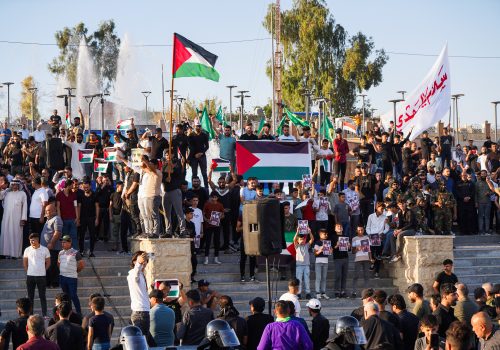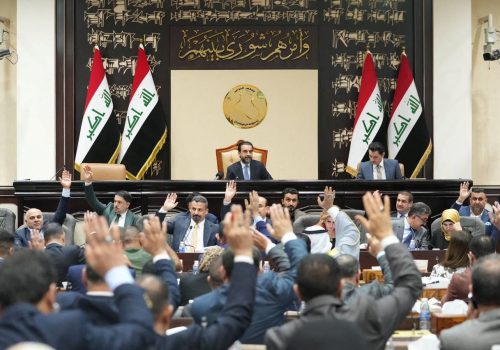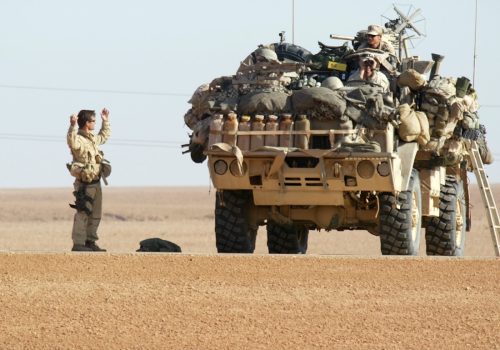The KDP is boycotting the upcoming elections. Iraqi Kurdistan may get stuck in an electoral impasse.
The Kurdistan Region of Iraq (KRI) faces a critical challenge as disputes between the Kurdistan Democratic Party (KDP) and the Patriotic Union of Kurdistan (PUK) threaten to derail the upcoming June elections. The power struggle between these dominant parties has reached a boiling point, with the KDP’s March 18 announcement that it would boycott the elections sending shockwaves through the region’s political landscape. Despite their flaws, elections in the KRI have been the sole source of unity and legitimacy for the region, which has two separate intelligence agencies, two separate Peshmerga forces, and two separate administrations that operate almost independently. The importance of these elections cannot be overstated, as they provide a mechanism for the two dominant parties—the KDP and the PUK—to peacefully resolve their differences and maintain stability in the region.
The tale of two parties
Following the 1991 Kurdish uprising in Iraq, Iraqi President Saddam Hussein withdrew central administration institutions from the Kurdish-controlled provinces of Erbil, Duhok, and Sulaymaniyah. The United Nations Security Council (UNSC) passed Resolution 688, imposing a no-fly zone and allowing the KRI to hold its first elections in 1992.
The KDP narrowly won the disputed 1992 elections. It eventually made a power-sharing agreement with the PUK to divide parliamentary seats and senior government positions equally. Later, in 1994, a civil war led to separate PUK and KDP administrations, with each party maintaining complete control over two separate geographical areas. The two parties became deeply entrenched, with Kurdistan Regional Government (KRG) institutions dependent on them.
The next regional elections didn’t take place until 2005, after the 2003 US invasion of Iraq. The KDP and PUK ran as an alliance to avoid disputes and won the overwhelming majority of the seats. But in 2009, that balance faced a new challenge with the rise of an opposition in Kurdistan.
SIGN UP FOR THIS WEEK IN THE MIDEAST NEWSLETTER
In 2009, the PUK faced an internal crisis as the opposition Change gained support from former PUK voters, leading the PUK to accept the KDP’s dominance over the KRG. The KDP exploited this to amend electoral laws, establish a regional electoral board, ratify results through the Kurdistan Judicial Council rather than the Federal Supreme Court, create a separate voter-registration system, and increase minority-quota seats—which historically voted in favor of the KDP in the parliament—from five to eleven. These changes allowed the KDP to increase its seats from 35 percent in 2005 to 44 percent in the 2018 elections, while the PUK declined from 34 percent in 2005 to 18 percent in 2018. The PUK, preoccupied with its internal struggles, tolerated this until 2021.
The PUK’s resurgence: challenging the KDP’s hegemony
After undergoing a leadership transformation in 2021, the PUK has focused on reforming the electoral law to restore the balance of power. The dispute between the two parties came to a head in 2022 when the KDP unilaterally passed a new electoral law with the support of minority seats, ignoring the PUK’s demands for voter-registration reform, district division, and minority-seat allocation. In response, the PUK filed a complaint with the Federal Supreme Court, which ultimately annulled the KDP-sponsored electoral law and ruled that the KRI would be divided into four districts, which meant eleven minority seats were canceled. The court also mandated that the Independent High Electoral Commission (IHEC), a federally elected board, oversee regional elections and that the federal voter-registration system be used.
The KDP’s hesitancy to participate in the upcoming June elections goes beyond its public stance against the Federal Supreme Court. The 2023 provincial elections in the federally controlled provinces served as a wake-up call for the party, as it faced a shocking defeat to the PUK in disputed areas. Since 2005, the KDP has dominated Kurdish votes in these areas. Still, in the 2023 provincial elections, the PUK won nine seats while the KDP only secured six—a sharp decline from the 2021 national parliamentary elections when the KDP won ten seats and the PUK seven.
Another concern is the new rules imposed by the IHEC, such as the exclusive use of electronic biometric cards for voting. This has disproportionately affected the KDP, as a majority of the nine hundred thousand voters of KRI use temporary cards—a temporary pass for voters without biometric voter IDs who reside in its strongholds of Erbil and Duhok. Voters in Iraq use biometric IDs to prevent voter fraud.
Furthermore, discrepancies between the Iraqi Federal Census Bureau and the Kurdistan Census Bureau have raised concerns about the accuracy of voter-registration data. The Federal Census Bureau estimates the combined population of Duhok and Erbil to be 3.4 million, while the Kurdistan Census Bureau data shows 3.9 million—a difference of more than half a million.
The PUK claims that the KDP-controlled Kurdistan census has inflated population numbers. Conversely, the Federal Census data estimates Sulaymaniyah and Halabja populations to be around 2,336,191, while Kurdistan data puts the figure at 2,268,000—a difference of 68,140 in Sulaymaniyah’s favor. The shift from KRG-controlled data to federal voter-registration data has left the KDP grappling with the prospect of diminished electoral performance.
Behind closed doors, the KDP has made demands to the IHEC, including establishing a counting center in Erbil, using Kurdistan’s voter-registration system, allowing voters with temporary registration receipts to vote, and increasing Halabja governorate seats from three to six. The Kurdistan Region President Nechirvan Barzani also made an official request to the IHEC, addressing some of these concerns, but the IHEC rejected the request. The PUK may accept some of these changes to accommodate the KDP’s concerns but is unlikely to concede to all of them.
Compromise or fragmentation?
Although there is no clear constitutional or legal path to dealing with Kurdistan’s internal crisis, the outcome of this electoral impasse could lead to several scenarios. The KDP’s main goal appears to be delaying the June elections; the IHEC’s term will expire in July, making it impossible to hold parliamentary elections until next year. Meanwhile, the PUK insists on holding the elections on time.
If elections are held and the KDP participates, the most likely outcome is a return to the 50-50 power-sharing agreement between the two parties, which the KDP seeks to avoid. If the PUK agrees, there might be a delay until October 2024 after some of KDP’s concerns are addressed. If the KDP refuses to participate and prevents elections in its dominated region, the PUK warns of the risk of the Kurdish Regional Government losing its legitimacy, which may invoke the unconstitutionality of Prime Minister Masrour Barzani’s position and call for the dissolution of the cabinet and for a transition government until elections are held. The worst-case scenario is a complete break-up of Sulaymaniyah from the KDP-controlled KRG, risking the Kurdistan Region of Iraq’s constitutional status as a federal region.
As the June election deadline looms, the future of Kurdistan’s political stability hangs in the balance. The international community watches closely, hoping to reach a compromise to ensure the democratic process prevails in the Kurdistan Region of Iraq. Despite their flaws, elections have been a source of legitimacy for the KDP and PUK to resolve differences peacefully. The longer elections are delayed, the higher the risk that instability in the Kurdistan Region of Iraq will spill over to the rest of Iraq, as both parties are influential partners in forming the Iraqi government.
Sarkawt Shamsulddin is a nonresident fellow at the Atlantic Council’s Middle East Programs and was a member of the Iraqi Parliament from 2018 to 2021.
Further reading
Tue, Nov 7, 2023
Iraq is at a crossroads. Will it choose its Shia militias or relations with the US?
MENASource By Sarkawt Shamsulddin
Iraq is facing a high-stakes balancing act that carries profound implications for its relations with the United States and regional stability.
Fri, Jun 16, 2023
How the international community can help Iraq on a path toward democratic stability
MENASource By Sarkawt Shamsulddin
The international community should increase its financial support for civil-society organizations in Iraq, as these play an instrumental role in reconciling ethnic divisions while promoting democratic principles among younger people.
Fri, Mar 17, 2023
How the war in Iraq changed the world—and what change could come next
MENASource By
Our experts break down how this conflict has transformed not only military operations and strategy, but also diplomacy, intelligence, national security, energy security, economic statecraft, and much more.
Image: Kurdistan Regional Government Prime Minister Nechirvan Barzani prepares to cast his vote at a polling station during parliamentary elections in the semi-autonomous region in Erbil, Iraq September 30, 2018. REUTERS/Thaier Al-Sudani


